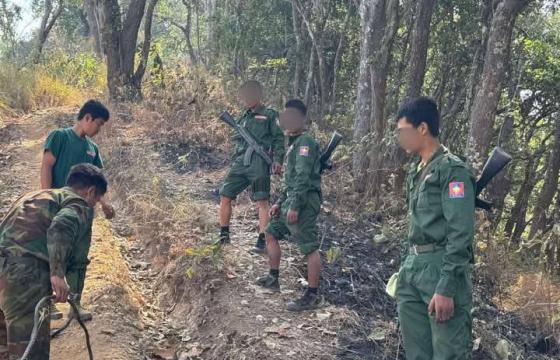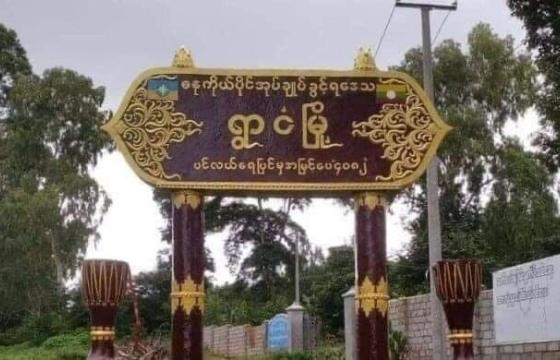On 21 November, the 55th memorial anniversary service of the death of the first president of the Union of Burma, Sao Shwe Thaik was held in Nyaungshwe – also spelled Yawnghwe in Shan – at his old residential Palace, led by Sao Haymar Thaik, his surviving youngest daughter, attended by Shan State government officials, venerable monks and a sizable number of sympathetic and politically aware Shans for the first time since he passed away.
It is extra-ordinary as it was allowed to hold the occasion for the first time since his death, as Sao Shwe Thaik’s residential Palace in Yawnghwe, also known as “Haw”, is now a museum, and is open to the public and doesn’t belong to the family anymore.
Sao Haymar Thaik has been trying to regain back the ownership of the Haw by writing petition letters to concerned authorities and through legal channel but so far has been not successful.
Biography
Sao Shwe Thaik, known in his full ritual style was Kambawsarahta Thiri Pawaramahawuntha Thudamaraza was born in 16 October 1896 and passed away while in detainment at the age of 66, in 21 November 1962.
He was a legendary and well-respected Shan political statesman in Burma, who proposed a vision on how the long term, sustainability of a voluntary union could be realized.
During his youth, he went to school at the Shan Chiefs’ School, later known a Kambawza College, in Taunggyi, Burma. He entered the British military service during World War I, and also served in the Northeast Frontier Service from 1920-1923. He became Saopha following the death of his father, Sao Maung in 1929. He again served in the military service from 1939 to 1942. He married four times, and had a total of eleven children according to the book titled: “The White Umbrella” an autobiography of his first and official wife Sao Nang Hearn Hkam, written by Patrica Eliott.
Following the independence from the British on January 4, 1948, he became the first president of the Union of Burma and served as the head of state of Burma between 1948 and 1952. In the aftermath of his tenure as the president, he served as the chairman of the chamber of nationalities until 1962.
In March 1962 the military staged a coup, under the pretext that the country is disintegrating because of the Shan-led federal amendment proposal, when he was arrested by the Revolutionary Council headed by General Ne Win and died in prison in November 1962. One of his sons at that time, a 17 year old, was killed in the March 1962 military coup, apparently the only casualty on the day of the coup.
Politial creed
Sao Shwe Thaik served as the president and head of state of the Union of Burma from 4 January 1948 until 16 March 1952. His first presidential address to the nation on the day of independence, 4 January 1948, outlined the virtue of unity, when he said: “Today is for us not only a day of freedom but also a day of reunion. For a long time, the principal races of Burma, the Kachins and the Chins have tended to look upon themselves as separate national units. Of late, a nobler vision, the vision of a Union of Burma, has moved our hearts, and we stand united to-day as one nation determined to work in unity and concord for the advancement of Burma’s interests and for the speedy attainment of her due position as one of the great nations of the world. It is unity which has brought our struggle for independence to this early fruition and may unity continue to be the watchword for every member of the Sovereign Independent Republic to be henceforth known as the Union of Burma.”
On 4 January 1949, a mass rally was held outside City Hall to mark the first anniversary of Independence Day, he delivered a warning speech on violence that destroyed freedom, liberty and democracy. He told the crowd: “Co-operation and understanding cannot come about so long as the element of violence or threat of violence exists, for violence has no counterpart in freedom, and liberty ends where violence begins. The progressive retreat of democracy in the world today is mainly due to the worship by nations of the cult of physical force. The deterioration in this direction has been such that the much-vaunted democracies are nowadays hardly distinguishable from totalitarian states.” He made a direct stab at his own country’s shortcomings, emphasizing the deteriorating political situation because of insurgencies and armed conflicts, according to the biography of his wife Sao Nang Hearn Hkam, in a book titled, “The White Umbrella” by Patricia Elliot.
The last phase
Perhaps the main cause that abruptly ended his political participation including his own life was the ethnic nationalities federal amendment proposal, popularly known as Shan federal proposal that he actively help formulated in 1961.
He was successful and instrumental in creating a new political entity, the Union Burma, together with General Aung San through the Panglong Agreement of 1947 in trying to solicit the non-Bamar ethnic nationalities, the Kachin and the Chin, including the Shan.
But in another political task of correcting power sharing imbalance, which was supposed to be more federal according to the agreement and spirit of Panglong Agreement, as was hampered by the fact that in reality the 1947 Union of Burma Constitution was “though in theory federal, is in practice unitary,” to quote U Chan Htun, the constitutional expert and adviser for interim Burmese government, he wasn’t successful.
The military coup took place with the pretext that the federal amendment proposal would break up the country, detaining all parliamentary representatives, including Sao Shwe Thaik.
He died in custody some nine months after the detainment with his political task to amend the constitution to be more federal unfinished. And after 55 years we are still nowhere near to achieve his noble goal and still muddling through to find a broad consensus that has plagued the country to achieve political harmony from the beginning.







